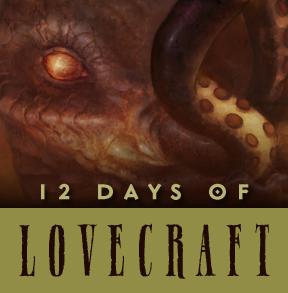As Jonathan Richman said, I love New England. Having said that, we’ve spent a lot of time in the nooks and crannies of my home region, peering into things both nnameable and unholy. So today, let’s visit Australia in the early 20th century as well as in earth’s pre-human past, as we encounter… “The Shadow Out of Time”!
The story:
Our narrator, Nathaniel Peaslee, loses 5 years of his life, during which time he is not himself. Literally. His wife leaves him, he studies much and travels widely, and when he regains his identity and sense of self, he has no memory of what’s happened in the years he suffered “amnesia.”
He does, though, have phantasmagorical dreams of alien cities. The dreams grow more detailed until they reveal the city exists on earth before humans and is ruled by a Great Race of iridescent cone beings who can project their consciousness through both time and space as they gather information for their giant library. (You may at this point have guessed what was going on while our narrator was an amnesiac, but it takes him scores of pages to reach the same conclusion.)
Off we go to to the desert in Australia to explore recently-discovered ruins that match his dreams and “pseudomemories. ” Late one night, he wanders the ruins and finds himself walking on dimly remembered paths to collect a book from the library. On his way out, he’s chased by an unseen creature of unspeakable evil, or possibly there’s just a sandstorm, but in either case he winds up face-down in the outback with no book and no way to find the path to the library again.
What’s Good:
Well, if you like Borges (the later, blow-your-mind Borges, not the early, knife-fight Borges) you’ll see here what seems to me like the foundation of much of Borges’ metaphysical ficciones. This race ruled the earth and went forward and backward in time, amassing knowledge about all ages of the earth as well as other planets. It’s a freaky and very cool concept, and the bookishly inclined among us will certainly dig the idea of the library that holds nearly universal knowledge. (And yeah, you’ll see that in one of Borges’ most famous tales, though not the one he dedicated to H.P., presumably because that would have made the ripoff influence a little too obvious.
Our narrator wanders the corridors of the ruined city, freaking out because he knows and remembers it even though his body has never been there. I found this to be great sense-of-wonder stuff: he’s kept the memory from when he swapped bodies with one of the conical librarians. Which was a few decades earlier for him, and also, you know, tens of thousands of years earlier. Duuuude.
What’s Horrible:
I wouldn’t say anything is horrible, but there are a few elements that don’t meet the high standard set by the story’s central conceit.
1) The conical former former librarians are described in detail and just seem silly to me. Iridescent cones, Howard? Really? Also, my inner 6th grader (sadly, he’s not that far below the surface) couldn’t stop giggling at this: “from their apexes projected four flexible, cylindrical members, each a foot thick…these members were sometimes contracted to almost nothing, and sometimes extended…up to ten feet.” Wow. Those are some large members, all right.
2) Howard: not every noun requires an adjective. I know this is a tic that plagues H.P. in many stories, but it seemed especially egregious in this one. Many successful writers found a way to use unmodified nouns in their work. H.P. would have benefited by following their example, at least a little bit.
3) This is an amazingly good science fiction story. It’s not really much of a horror story, though. There’s nothing wrong with that, except that H.P. clearly thinks it’s a horror story. The narrator is traumatized and expects us to share his horror at the existence of these well-endowed, conical, time-traveling librarians, but to me the whole idea just seemed cool. Yeah, he was evicted from his body for 5 years, but he got it back. No harm, no foul!
Seamus Cooper is the author of The Mall of Cthulhu (Night Shade Books, 2009). He lives in Boston, and what projects from his apex is none of your business.










